Suivi et évaluation
La plupart des défis liés au suivi et à l’évaluation, comme la quantité insuffisante d’investissements et le manque de capacités, ne sont pas spécifiques à l’assistance monétaire, mais ceux qui le sont concernent principalement le suivi des résultats des transferts non affectés. La flexibilité des transferts monétaires peut compliquer la définition d’indicateurs de résultats appropriés, qui pourraient impliquer un mélange d’indicateurs spécifiques au secteur et transversaux. En parallèle, il existe des limitations au moment de collecter des données précises sur la manière dont les transferts monétaires sont dépensés.
Les signataires du Grand Bargain se sont engagés à garantir que des mécanismes de suivi et d’évaluation pertinents des transferts monétaires soient en place, et à assurer une meilleure compréhension des coûts, avantages, impacts et risques de cette modalité par rapport à d’autres. En partant de cet engagement, le chantier du Grand Bargain sur les transferts monétaires a établi plusieurs points d’action, dont le développement d’indicateurs de résultats communs pour les transferts monétaires à usages multiples, et des indicateurs pour l’analyse de l’optimisation des ressources. L’analyse systématique de l’optimisation des ressources a été rendue difficile par plusieurs facteurs, dont un manque d’approches approuvées, le besoin en données sur les résultats en termes de qualité et le caractère intensif de l’analyse.
Priorités actuelles
Dans le cadre des engagements du chantier du Grand Bargain sur les transferts monétaires, le CALP Network a co-dirigé (avec l’USAID et CRS) la mise au point d’indicateurs de résultats des transferts monétaires à usages multiples. Le projet à tester est actuellement disponible en anglais, espagnol et français, via la bibliothèque.
Initiatives associées
Contenu présenté

Indicateurs de résultats des transferts monétaires à usages multiples : Projet final à tester
Guides et outils
Les indicateurs présentés dans ce document se concentrent sur les principaux objectifs des TMUM humanitaires et sur les résultats auxquels les transferts monétaires à usages multiples peuvent le plus fortement contribuer. (Par exemple, certaines interventions en TMUM visent à relier les personnes aux systèmes de protection sociale après la fin du TMUM; mais nous n’avons pas inclus...

Monitoring 4 CTP: Monitoring Guidance for CTP in Emergencies
Guidelines and Tools
This guidance provides a central resource to promote a common understanding of the most important monitoring considerations for humanitarian projects using cash transfer programming (CTP). The primary audience for this guidance is field-level practitioners, from organisations directly involved in the design, implementation, monitoring, and accountability of projects using cash and vouchers...

Cost-Efficiency Analysis of Basic Needs Programs: Best Practice Guidance for Humanitarian Agencies
Guidelines and Tools
The Efficiency, Effectiveness and Value for Money Sub-Workstream is pleased to share the final output on Cost-Efficiency Analysis of Basic Needs Programs: Best Practice Guidance for Humanitarian Agencies (attached).
Cost-efficiency analysis estimates the ratio of program costs to outputs created, allowing you to compare cost-per-output for programs which all produced the same output. Such...
Thematic lead
Contenu récent
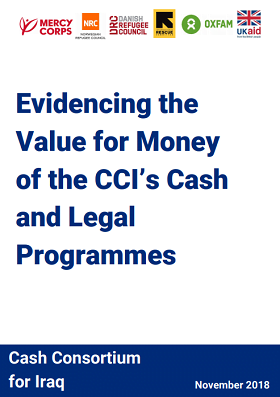
Evidencing the Value for Money of the CCI’s Cash and Legal Programmes
Report
Value for Money (VfM) considerations are an increasingly common requisite in humanitarian programmes. The UK’s Department for International Development (DFID) supports the adoption and scale-up of cash programming in humanitarian settings where appropriate, as both a more effective means for people to...

Cash-Based Programming in South Sudan
Report
This rapid review provides a synthesis of evaluations and learning reviews of cash-based programming in South Sudan. There is evidence that in South Sudan the cash-based programming help poor households address food needs and nutrition; and by injecting funds from vouchers, paid work, or grants into the...
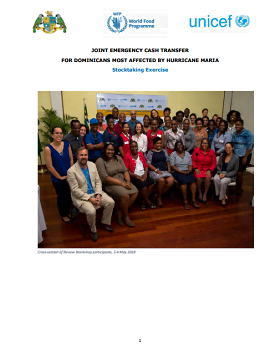
Joint Emergency Cash Transfer for Dominicans Most Affected by Hurricane Maria Stocktaking Exercise Report
Report
A workshop was organized in Roseau, Dominica on 3-4 May 2018, to bring together all the stakeholders involved at different levels and stages in the joint Emergency Cash Transfer programme that was implemented from December 2017 to March 2018 as part of the emergency response to Hurricane Maria. The report...
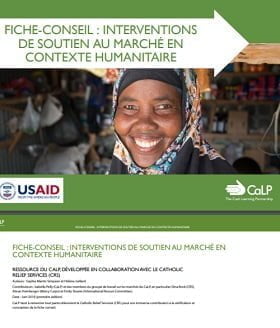
Fiche-Conseil : Interventions de soutien au marché en contexte humanitaire
Guides et outils
La fiche conseil définit le programme de soutien au marché en contexte humanitaire et le décrit dans la pratique. Elle permet aux praticiens humanitaires d’envisager systématiquement des interventions de soutien au marché, parallèlement à d’autres activités du programme. Le champ...

Social Accountability in the Delivery of Social Protection – Ethiopia case study
Report
Social accountability initiatives in two local areas in Ethiopia contributed to improvements in the service delivery of a social protection programme and state-society relations. But the social accountability mechanisms benefited the most marginalised citizens less. A new report by Development Pathways...
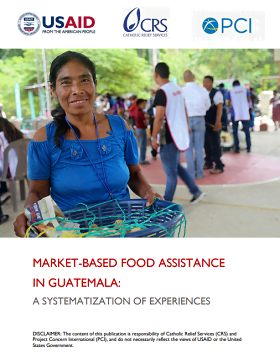
Market-based Food Assistance in Guatemala: A Systematization of Experiences
Guidelines and Tools
In April 2017, at the request of the United States Agency for International Development’s (USAID) Office of Food for Peace (FFP) in Guatemala, Catholic Relief Services (CRS) and Project Concern International (PCI) designed a process to gather and synthesize the experiences of food assistance...
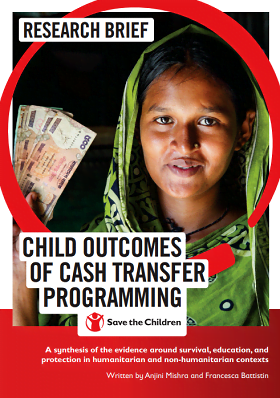
Child Outcomes of Cash Transfer Programming: Research Brief
Report
Humanitarian emergencies are increasing in both frequency and duration. It is evident that children bear the brunt of these situations and that these experiences have long-lasting effects on their development and future. The figures for the number of children affected by humanitarian emergencies are...

Assessment of the Geographical and Community-based Targeting of WFP’s Cash and Food for Assets Programme in Kenya
Report
This report provides an in-depth assessment of the targeting mechanisms used for the cash and food for assets programme by the World Food Programme (WFP) and the National Drought Management Authority (NDMA). Assessment of the Geographical and Community-based Targeting of WFP’s Cash and Food for Assets...
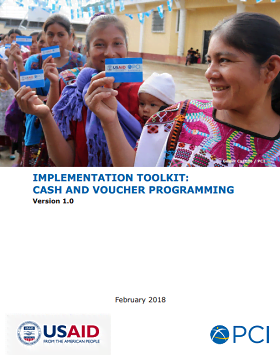
Implementation Toolkit: Cash and Voucher Programming
Guidelines and Tools
This set of tools developed by PCI seeks to harmonize language and approaches for use by teams involved in the design and implementation of cash transfer programs and is not intended to be a complete guide for design and implementation. The tool box focuses on the crucial steps within the program cycle of...

Child Outcomes of Cash Transfer Programming: Appendix 1
Report
This is an appendix to the document “Research brief: Child outcomes of cash transfer programming. A synthesis of the evidence around survival, education and protection in humanitarian and non-humanitarian contexts”. This appendix contains the list of studies that were reviewed, with information on...

Transfer Values in Kenya’s National Social Security System
Report
This report, commissioned by the World Food Programme (WFP) and United Nations Children’s Fund (UNICEF) seeks to examine the current transfer values of Kenya’s tax-financed social security schemes and assess whether they are set at an appropriate level. Transfer Values in Kenya’s National Social...
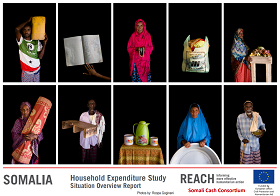
Somalia Household Expenditure Study
Report
To gain a better understanding of how recipients utilise cash transfers and prioritise spending needs, REACH, through the Somali Cash Consortium, conducted a study on the expenditure patterns of cash transfer beneficiaries.

Child Outcomes of Cash Transfer Programming: Appendix 2
Report
This is an appendix to the document “Research brief: Child outcomes of cash transfer programming. A synthesis of the evidence around survival, education and protection in humanitarian and non-humanitarian contexts”. This appendix contains a summary of the available evidence per each outcome of...

Child Vulnerability and Social Protection in Kenya
Report
Kenya’s Social Protection Secretariat has highlighted new evidence showing the need for a universal child grant for Kenyan children. The evidence in Child Vulnerability and Social Protection in Kenya highlights that targeting social protection at orphans, 7.5% of Kenya’s children, with a Cash Transfer...

Tracking Cash & Voucher Assistance Workshop – Part 2: Report
Presentation
Do you want to read the latest on discussions on how to best track cash and voucher assistance in global interagency reporting systems? The CALP Network and ECHO have just released Tracking Cash & Voucher Assistance Workshop – Part 2: Report. Key recommendations emerging from the workshop are summarized...

Hygiene NFI Provision through Cash Assistance with E-Voucher Modality: PDM
Report
NCA & LWF Gure-shembola Refugee Camp CBI PDM report.

Social Accountability in the Delivery of Social Protection: Technical Guidance Note
Guidelines and Tools
How can citizens better hold social protection officials to account and ensure that they can understand their entitlements? Development Pathways’ research project on social accountability in social protection for the UK’s Department for International Development provides some answers. Social...
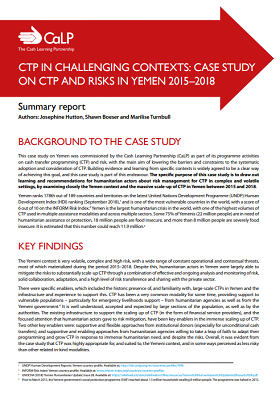
CTP in Challenging Contexts: Case Study on CTP and Risks in Yemen 2015–2018 – Summary
Report
Yemen is one of the most vulnerable countries in the world, and has long suffered from poverty, instability and vulnerability. The conflict, which has unravelled since late 2014, and, more specifically, since March 2015, has left 22 million Yemenis in need of some kind of humanitarian assistance or...
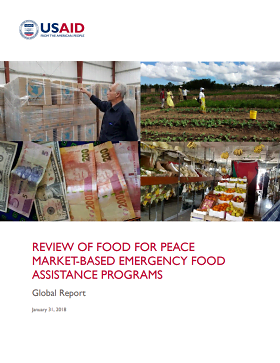
Review of Food for Peace Market-Based Emergency Food Assistance Programs Global Report
Report
Efficient and effective use of humanitarian funds is critical to meet the emergency needs of as many people as possible, especially as emergencies in developing countries have become more numerous, complex, and protracted. The United States Agency for International Development (USAID) Office of Food for...

Gure- Shembola Refugee camp E-vouchor pilot program- Learning Document
Report
Norwegian Church Aid (NCA) in partner with Lutheran World Federation (LWF) have been completed their project using CBI approach. The project was aimed to provide Gure Shembola refugees with access to their choice of hygiene items through an e-voucher system. This learning document aims to document the...



